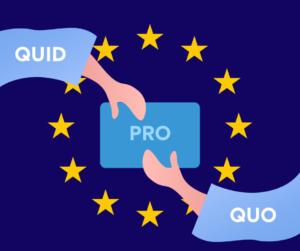Headquarters: Svetog Nauma 7, 11000
Office address: Đorđa Vajferta 13, 11000
Phone:: +381 11 4529 323

Following the European Parliament (EP) elections and the start of the process of forming new EU bodies, it is obvious that the Union as we know it today is set to change.
The EP appears more fragmented than ever before, with traditional political groups having suffered their worst results. Yet, it would be wrong to consider this outcome as purely negative. The pluralism of the contesting political actors and ideas in the EP reflect the shift in the mood of EU citizens. And while mirroring their concerns (the future of work, climate change, migration), it also better represents the new reality within the Union.
The election of Ursula von der Leyen as President of the European Commission (EC) was a product of this new reality. Her candidacy deviated from the Spitzenkandidaten process and was a direct product of back-room deals between the leaders of EU member states. In this context, she was confirmed as the new Commission president by a wafer-thin majority of nine votes in the EP (383/747). In her address before the EP, she vowed to tackle climate change, make the EU more democratic, deal with migrations, place a greater emphasis on social justice, strengthen the EU’s global role and lead an uncompromising fight for the rule of law. The circumstances of her election, however, will have a significant impact on her ability to steer her programme and the EU’s policies during her term.
EU policies will continue to be under the strong influence of the national politics of member states. This also includes the future of the EU enlargement process. One of the first signs of the EU’s intentions regarding the enlargement policy will be the composition of the new European Commission and the distribution of portfolios. A comprehensive, credible and efficient EU enlargement policy requires administrative, institutional and financial support with a name, a face and a telephone number in Brussels. Rumours about the future of DG NEAR are rightfully causing unease among candidates and potential candidate countries. Nevertheless, a good sign is that three EU member states are currently showing an interest in the Enlargement portfolio (according to diplomatic sources).
Regardless of the future composition and structure of the next EC, there are several key points that Western Balkan countries should address. First, they should put their differences aside and try to formulate a common vision of the Western Balkans as a future EU region. Joint vocal support for Albania and North Macedonia to start EU accession negotiations, and support to visa liberalisation for Kosovo citizens could mark a positive change in the regional atmosphere. Closer cooperation and regional integration is the right way for these countries to present themselves as credible future members. Second, resolving the legacy of the recent past and remaining bilateral issues represent preconditions to move forward. Without the comprehensive normalisation of relations in the region, Western Balkan countries will not be able to function and cooperate as EU members.
Third, the governments of the region should pay particular attention to reforms addressing the rule of law. The New Commission President noted that there will be no compromise with respect to the rule of law in EU member states. It is obvious that requirements for rule of law reforms in candidate and potential candidate countries will come into focus even more in the future. The announced introduction of an EU-wide Rule of Law Mechanism should be extended to candidate and potential candidate countries. That would enable better and more objective benchmarking for aspiring countries, more effective monitoring of progress and better leverage in assuring the sustainability of reforms in Western Balkan countries. Furthermore, by applying this mechanism simultaneously in EU member states and candidate countries, it would be a positive sign that the process of deepening the EU’s policies can happen in unison with the Union’s enlargement.
Fourth, requests for more democracy in the EU should also be mirrored in the Western Balkans. The announcement of a “Conference on the Future of Europe” (to start in 2020 and run for two years) and consultations with EU citizens should also include future members. This would provide a good opportunity to open dialogue, improve communication with citizens of the region significantly, and engage civil society in contributing to the debate.
Fifth, in parallel with the process of establishing a new institutional setting, discussion of the Multi-annual Financial Framework 2021-2027 is ongoing. Western Balkan countries should use the opportunity to jointly advocate for stronger structural support to the region, especially in areas of infrastructure, digital connectivity, energy, and the environment and climate change. Structural support in the Western Balkans is a strategic investment in future EU infrastructure.
The summer of 2019 is, in many ways, important for the future of both the EU and the Western Balkans. The EU is beginning a new institutional cycle with a large number of challenges that offer an opportunity for the current generation of decision-makers to address the concerns of EU citizens. The future of Europe depends on its ability to deal with global uncertainties imposed by allies, foes and contenders. One of the pieces of this multidimensional puzzle is the question of the Union’s ability to integrate Western Balkan countries and demonstrate confidence, capabilities and strategic autonomy. This is why the summer of 2019 is not (exclusively) for holidays; in fact, it is one of those treacherous summers that can define the future course of Europe.
This article was originally published in CorD magazine and on their website.